Chris Brunner – September 29, 2020
The 2020 Lunchtime Challenge, (LTC), reached an audience of more than 3,000 people through the creative promotional campaigns of 40 undergraduate students from multiple disciplines who raised awareness about One Health issues as diverse as an innovative integrated method of reducing agricultural waste utilizing black fly larvae, to the harmony between marine ecology and human health, and the impacts of deforestation for the production of palm oil.
Tenacity through trials
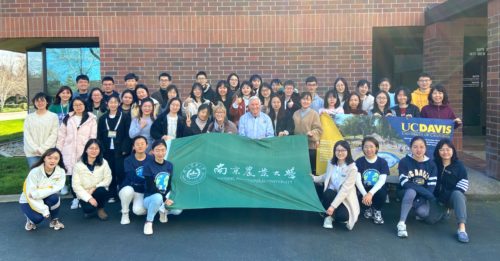
Students and interns attending 2020 winter conference gather outside the WIFSS office with UC Davis’s Chris Brunner and Bennie Osburn (center holding banner), and Jenny Chen (second row far right holding banner), for final group photo before boarding bus for the airport
The record-breaking competition was achieved through the determination of students who could not be discouraged by a world-wide pandemic. The Lunchtime Challenge has a history of students attending a 3-week education conference on One Health for food safety and security at UC Davis where teams bond through classroom activities and field trips and final-day celebrations. However, the 2020 winter conference was required to finish a week ahead of schedule due to the COVID-19 outbreak which meant cutting short that critical final week of working together on their projects. Despite the sudden upheaval brought about by the pandemic, these tenacious students completed their final projects online at home on quarantine.
Generally students who attend the winter conference return to Nanjing Agriculturally University, (NAU), ready to continue working together on their teams competing in the LTC in the spring dedicating more than 16 lunch periods, spanning two months, to develop well-planned strategies for collecting relevant information through surveys, seeking solutions to identified problems, and defining a means of informing the public of the issues. This year, students who took the initiative to participate in the LTC did so knowing they would be doing it solely online. Some of the students who had attended the winter conference joined members of the NAU One Health Club and other students from across campus to compete in the Challenge.
The Lunchtime Challenge culminates in a Zoom call between Nanjing and Davis and this year’s Challenge was no different when the LTC teams presented their final reports to faculty and staff at UC Davis by Zoom on June 13.
LTC sets a high bar
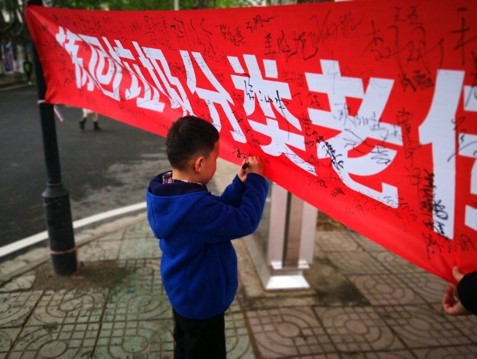
At the street fair a young boy signs his name to a banner which reads “bring glory to garbage classification tradition and advocate green civilization and new fashion
The 2018 Lunchtime Challenge’s winning team, Return of the King, educated nearly 100 students at an on-campus lecture and more than 400 people who attended a street fair through its War on Plastics to raise attention to plastic waste and developing a habit to classify waste into separate containers. Comparing the 500 percent increase in the numbers of people reached during the 2018 Challenge to the numbers reached during the 2020 online Challenge demonstrates the high bar set by the LTC to raise awareness of complex issues impacting the well-being of people, animals and their shared environment.
LTC under direction of Student One Health Club
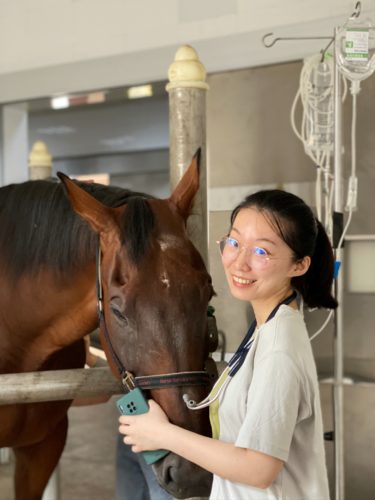
Gigi Wang, a junior student majoring in veterinary medicine, enjoyed her 2-week internship at Hailan Equine Clinic in Wuxi
The Nanjing Agricultural University, (NAU), Student One Health Club under the leadership of president, Siqi (Gigi) Wang, united six teams during eight weeks of online team work to achieve a record-breaking competition.
The One Health Club, which organizes the LTC in collaboration with Bennie Osburn and Chris Brunner of the Western Institute for Food Safety and Security (WIFSS), was established in 2015. This year’s LTC boasted the most participants in its four-year history and caught the attention of Team iGEM-NAU.
“Nearly all undergraduate students know Team iGEM-NAU and their incredible accomplishment,” said Gigi.
The International Genetically Engineered Machine (iGEM) competition attracts famous universities from all over the world every year, such as MIT, Harvard University and University of Cambridge. Teams from NAU participating in the iGEM have won five gold medals during the last five years. Although iGEM did not officially participate in the LTC competition they did present a lecture on “Heavy Metal Contaminated Soil: How to Utilize Earthworms to Save It.”
Dr. Bennie Osburn, Dean Emeritus of the School of Veterinary Medicine at UC Davis, and Director for Outreach and Training at WIFSS, shared his thoughts with iGEM team members about their presentation when he said, “The topic your team has selected to study, lead toxicity, is an excellent example of an environmental problem affecting human health. Young children are often affected with lead poisoning because of contaminated, air, water or foods. Lead toxicity can affect neurological and cognitive development. There is a need for creative thinking of ways to mitigate the toxic effects of lead that is in the environment, so finding new ways of detoxifying the chemical or partitioning it out of the food or water supply is also attractive.”
How did they do it?
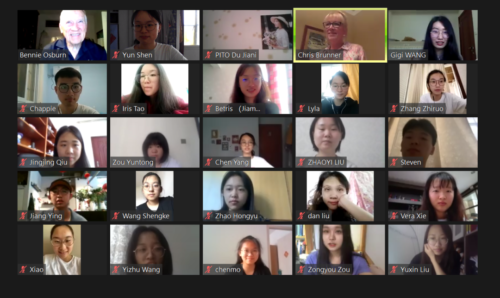
When asked to explain the strategy for bringing this diverse group of students together for the LTC, Gigi responded, “This year’s Lunchtime Challenge broke the customary restrictions on participation, and we opened recruitment to students outside the One Health Club, and to students who had not previously attended the conference in Davis.”
Gigi added, “Friends told friends, who told friends.”
Gigi believes the marketing on WeChat captured their attention by promoting:
- Thinking collision of interdisciplinary communication
- In-depth understanding of One Health concept
- Close friendships with friends of different grades and different majors
- Opportunities for face-to-face communication with UC Davis professors
- Certificate of completion
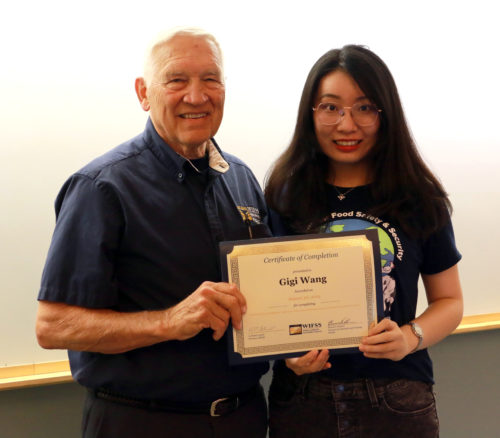
Gigi receives Certificate of Completion from Dr. Osburn as Intern at 2019 Summer One Health for Food Systems Conference: Integrating Veterinary, Food, Animal and Agricultural Sciences
Dr. Osburn explains that part of the success of the One Health conferences and the LTC competition stems from the fact that, “WIFSS encourages the student teams to select problems or issues which they feel are important to their home country. The students then devise a plan that raises awareness of the issue, follows through with justifying the background of why this is of importance and then uses the format which applies the holistic approach of including people, animals, plants and the environment. Since the students are from many different disciplines making up the team, they are given the freedom to become creative through this format to address and make recommendations on how to solve, mitigate or suggest a solution to the problem. Their enthusiasm for these projects through the LTC results in amazing understanding of One Health approaches to solve these significant issues.”
Meet the teams
Meet the teams of the 2020 Lunchtime Challenge: E-Circle, Geronimo, IBF, Vitamin C, PALM and PITO.
Team PALM
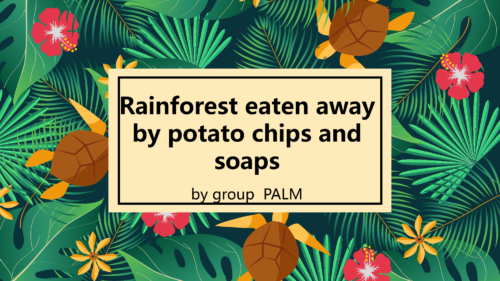
Team PALM educated the audience about the devastating impact of the destruction of tropical rainforests to produce palm oil.
As team PALM tells the story, “In order to obtain palm oil, people cut down tropical rainforests to grow palm trees, and the massive destruction of tropical rainforest causes greenhouse effects, causing global warming and frequent extreme weather phenomena, and this in turn impacts the wildlife, and animals lose their habitats and move into human habitat, where they are preyed on by humans, and parasitic viruses in animals enter the human population, thus endangering human health.”
PALM reached close to 1,000 people through promotional activities such as their video “Rainforest eaten away by potato chips and soaps” which calls for the conservation of the forests that are the earth’s lungs, and the earth’s largest reservoir of carbon. The PALM video received positive feedback from the almost 750 people who watched the video. In addition, PALM raised awareness through a survey of more than 230 people about the importance of looking for the RSPO certification when shopping for products that contain palm oil. The RSPO certification is an assurance to the customer that the standard of palm oil production is sustainable.
Team PITO
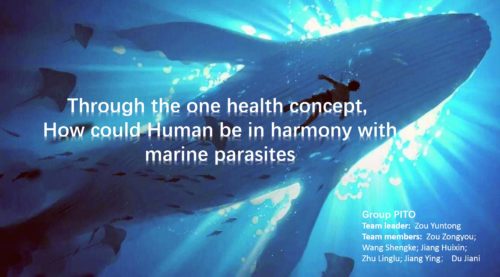
Team PITO, which stands for Parasites in the Ocean, won the competition with their project that looked at the nearly 300-fold increase of Anasakis parasites in the past few decades and the causes of climate change, changes in marine species richness, and increased human activity. They propose Anisakis is a wake-up call for marine ecology, human health, and climate change. Their final presentation was entitled, “Through the one health concept, How could Human be in harmony with marine parasites.”
The team reported, “The reasons for the outbreak of Anisakis are complex and various, including climate change, changes in nutrients and ocean currents due to human activities such as fertilizer use, and changes in Marine mammal populations over the same period. To explore the factors behind it and propose some solutions about it, we must base on one health concept to see whether we could figure out some feasible measures.”
The inspiration for the topic chosen for the PITO project, which reached well over 1,000 people, was a story posted on WeChat that warned people to intake less raw fish in order stay safe under the circumstances of the outbreak of Anisakis. Ms. Zou Yuntong, team leader of PITO, was busy delving into the problem when she came across the research article, “It’s a wormy world: Meta‐analysis reveals several decades of change in the global abundance of the parasitic nematodes Anisakis spp. and Pseudoterranova spp. in marine fishes and invertebrates.”
Zou says, “I realized that it could be highly connected with the One Health concept. Especially after reading the original paper on the website of University of Washington carefully,” and she goes on to say, “I was shocked that such a simple phenomenon may have so many connections with human and environmental factors while causing the tremendous marine ecological impacts.”
Soon after studying the article, she contacted WIFSS and asked if Dr. Osburn and Chris Brunner could help facilitate a meeting between NAU, University of Washington and UC Davis. Zou was off to the races coordinating the workshop. Ms. Yuntong got in touch with Dr. Chelsea Wood from the School of Aquatic and Fishery Sciences, University of Washington, whose program explores the ecology of infectious disease in a changing world and invited her to speak at the workshop. The list of speakers grew from there to include Dr. Joe Gaydos and Marguerite Pappaioanou.
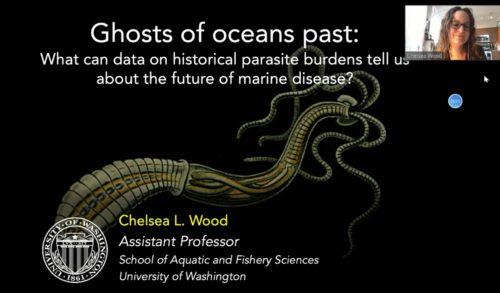 The Zoom WORKSHOP held on June 3 highlighted the connection between humans and animals and infectious disease.
The Zoom WORKSHOP held on June 3 highlighted the connection between humans and animals and infectious disease.
Practitioners of One Health are working to understand how they can create a healthier future for people and for nature, as Dr. Wood, pointed out in her lecture on “Ghosts of oceans past: What can data on historical parasite burdens tell us about the future of marine disease?”
Dr. Wood describes, “Our work so far shows the power of looking into the past to understand what One Health practitioners should be thinking of when they envision a healthy ecosystem.” The studies in her laboratory correlate the increasing ocean temperature and pollution factors which favor increased invertebrate populations which are intermediate hosts for the anasakis larvae which are then eaten by the fish. Ultimately, the final host of anasakis are marine mammals and the incidental hosts are people who consume raw sushi.
Dr. Joe Gaydos, Science Director of SeaDoc Society with the Karen C. Drayer Wildlife Health Center at the UC Davis One Health Institute who conducts and sponsors ground-breaking marine research to uncover the environmental factors threatening to unravel the web of life in the Salish Sea and surrounding watersheds, gave a presentation on, “Environmental and host factors which cause changes in wildlife susceptibility to pathogens.”
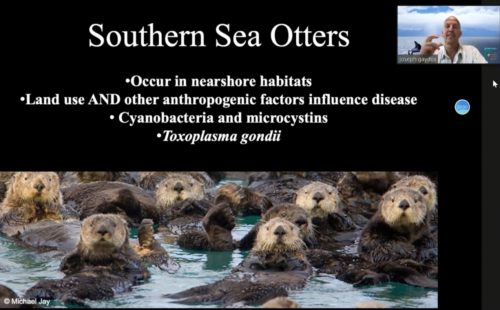
Gaydos focused his remarks on the complexity of the relationship between environment and health, specifically the interaction between three components consisting of the pathogen, the host, and the environment. He talked about some of the things that we do as people to the environment and how that affects disease and gave examples of what we do on land and how that touches the ocean.
Dr. Marguerite Pappaioanou, an Affiliate Professor in the Department of Environmental and Occupational Health Sciences in the School of Public Health at the University of Washington in Seattle, where she contributes to the research, teaching, and outreach programs of the Center for One Health Research, held a discussion about the human health connection. She gave an overview of the epidemiology of Anasakis as it impacts human health. She outlined some of the complexities associated with identifying the source of the infection based on human consumption; the source of the food eaten, and the time lapse of consumption prior to becoming sick. Ideally the public health units receive the history of the patient’s symptoms from physicians. In the meantime, they will continue to determine if other people have consumed the raw fish meal and whether the fish had been subjected to a “kill step” which includes freezing or cooked to kill the parasites.
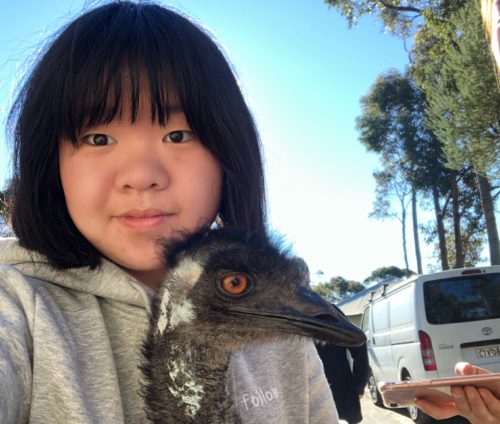
Zou enjoys her two-week internship with an emu at a wildlife park in Sydney, Australia
Zou Yuntong, a student majoring in veterinary medicine at NAU, and team leader for PITO, speaks for the team when she reports about the effect and influence of participating in the LTC:
“We learned to solve problems more dialectically and believed that a better understanding of how parasites contribute to the communities and ecosystems in which they are embedded is a critical need as we consider how to make the world less wormy.”
Team IBF

Team IBF, a.k.a. Insect Burger Factory, promoted farming and eating insects which contain high quality protein, vitamins and amino acids for humans. IBF believes that in the future, with the continuous growth of population, available space and resources will enter a tense state. The high nutritional value and relatively short cycle of insect farming makes edible insect farming an alternative to the consumption of traditional livestock products.
IBF and PITO co-organized a subsequent seminar for the whole university on June 7, called “A bite of worm—- is that your treasure of nutrients or hidden danger to your health.” The teams got 275 participants to attend their online seminar through an application called ‘Tencent Meeting.’ In this workshop the teams focused on food safety under the worm and appealing the people to be conscious about the ‘wormy food challenge.’ PITO shared the most advanced ideas from the PITO workshop to the public. The PITO and IBF seminar was supported by the One Health Club which helped attract more students to come to this co-organized seminar.
Zou says, “This is a great example about how to combine the LTC with the strengths of One Health Club and make the most of it.”
Team Vitamin C

Team Vitamin C gave a presentation on “Health care products — To take or Not to take?” The team researched environmental impacts of health products and found there may be environmental pollution problems in the process of making health products. Through social media, the team linked with 116 students who took the “Keep Healthy Lifestyle 12 Days Challenge” with the goals of: 1) Get up early and go to bed early; 2) Keep working out, and; 3) Eat healthily. The concluded, “After group discussion, we believe that the composition and efficacy of health care products are closely related to food engineering and nutrition, and the marketing means of health care products and people’s consumption behaviors are related to economics and sociology.”
Team Geronimo
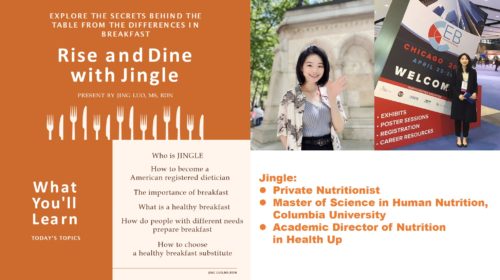
Team Geronimo entitled their final presentation, “Explore the secrets behind the breakfast.” After conducting a questionnaire, they found that classmates don’t realize the importance of breakfast, and even if they realize it, they don’t have time in the morning to prepare or the choice for breakfast is limited. Still others know that skipping breakfast will do a lot of harm, but they don’t care. Team Geronimo felt compelled to warn their classmates, “To attach more importance to breakfast & bring revelation about healthy diet.” To enlighten people to the importance of a balanced diet they conducted a workshop that attracted 360 people to an online lecture with nutritionist guest speaker Jing Luo where a serious discussion took place about the importance of eating a healthy breakfast.
Combined with the questionnaire, literature and their own imagination, Team Geronimo, who reached 370 people, proposes future breakfasts might require using big data, such as real-time chip monitoring, meeting business or leisure demands, and combining individual differences. Future breakfasts may include private customization such as breakfasts delivered real time to desired location or the go to packaged pill to start the day in the future. Human body chip real-time monitoring indicators, data link to businesses, personalized breakfast, and door-to-door delivery may also be a part of future breakfasts, including, using modern medicine and other knowledge to design breakfast food, such as personalized design of bioactive peptide with nutrition and biological functional required- antihypertensive peptide needed for the day.
Team E-Circle
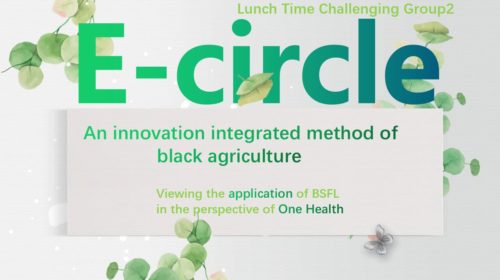
Team E-Circle talked about using black soldier fly larvae (BSFL) as a source of degrading agricultural waste for fertilizer and energy in their presentation on “An innovation integrated method of black agriculture, viewing the application of BSFL in the perspective of One Health.” The team’s concept was to find an alternative way of disposing of agricultural wastes including manure from animals and plant waste. The process was designed to speed up the method of disposing of animal waste by directly applying BSFL rather than applying on crops or through composting. They selected the black soldier fly whose larvae consume waste products as part of their diet. By doing this, they shorten the processing time of breaking down waste and the natural odors of the waste. They then suggest that the larvae can be provided as feed to animals as a source of protein. The larvae are also processed to extract the oils, and this can then be added to biofuels for energy purposes. This processing method could be used as a new rural industry employing labor, feed and energy for local communities.
E-Circle who reached 275 people believes, “One day, volunteer teams consisting of college students will rise, opening up a new world for agricultural technology!”
Continuing to influence thousands

The NAU One Health Club is the first Chinese One Health Club to appear on the global map of ISOHA One Health Student Organizations. Gigi Wang introduced the club at the ISOHA, Inaugural Asians Who’s Who in Student One Health Webinar and shared its club activities including the Lunchtime Challenge and international workshops. Gigi says the NAU One Health Club will keep in touch with the International Student of One Health Alliance, ISOHA, to exchange ideas with other Asian One Health Clubs more often in the future. There are plans to invite other Asian One Health Clubs to participate in a Lunchtime Challenge.
Gigi and Zou have found that it is common to see that many student clubs in China are working hard for environmental protection affairs. These clubs focus mainly on practical actions which benefit the environment, such as picking up trash on the beach, and holding recycle campaigns. However, many of them lack the theoretical understanding of the One Health concept. Gigi and Zou feel that if these clubs could weave their practical action and One Health concept together, it would be a great breakthrough for them to explore the further cooperation with other organizations in the future. This in turn will lead to the establishment of One Health clubs throughout China’s leading universities. The students are at a place in their education where the doors are open that lead to many paths that could lead to a career that helps save the planet.
“Our goal” says Gigi and Zou, “is to demonstrate that it requires team work and it will require multiple scientists and subject matter experts, even economists, sociologists, environmental philanthropists, writers, and photographers, to gather the scientific data, communicate the science, and influence the public to make a change.”
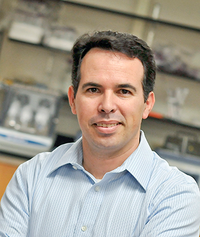
Dr. Jorge Rodrigues has taught about soil health and linking ecosystem health to human and animal health and the challenges and opportunities related to such work at five UC Davis education conferences on One Health for food safety and security, sponsored by UC Davis-WIFSS
With this goal in mind, Gigi and Zou have set out to spread the word of the concept of One Health to student clubs at sister universities, and they took one giant step on September 11 when they held the PALM Workshop, named in honor of the LTC team PALM who is interested in the conservation of rainforests. The workshop was attended by 173 students, including 87 in the Zoom meeting and 86 in the broadcast Tencent meeting room. Students majoring in environmental sciences from Nanjing Agricultural University and Harbin Engineering University participated in the workshop which featured Dr. Jorge Rodrigues as guest speaker. Dr. Rodrigues, a professor in the Department of Land, Air and Water Resources, at UC Davis, specializes in soil microbiology. His research interests are microbial ecology, tropical forests, land use change, biodiversity, metagenomics, metaproteomic, ecological genomics, lignocellulose conversion, microbial physiology.
Dr. Rodrigues explained to the audience at the PALM workshop, “There are many benefits of microorganisms interacting with plants: microbes help with biocontrol of other microorganisms, promote nitrogen fixation, provide growth through hormones, allow for nutrients to be recycled and stabilize soil preventing erosion.”
One Health Club activities and Lunchtime Challenges have a promising future with individuals like Gigi Wang and Zou Yuntong in charge. Gigi recently turned the reins of the Club presidency over to Zou, and you can rest assured with Zou in charge that the One Health Club and its Lunchtime Challenges will continue to influence thousands!

